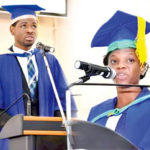Ayesha Harruna Attah is a biochemist and a writer from Ghana. Between 2009 and 2018, she has published three novels and won awards for them. In this interview by KINGSLEY ALUMONA, she talked about her books, her hobbies and her Ghanaian dreams.
Osinbajo to chair extended NEC meeting on Friday
COULD you briefly tell us something about yourself?
I am from Ghana and currently live in Senegal.
Your parents are writers. Would you say they influenced you to be a writer or you personally decided to be one?
Subconsciously, I’m sure they influenced me. But when I was trying to control my own path, I ran away from them. I studied science in the hope of becoming a doctor or scientist. I took writing classes in college and found that I was more passionate about writing. When I finally began to pursue writing as a career, it felt like a decision I made myself.
You have a degree in Biochemistry and an MFA in Creative Writing. Between science and writing, which one makes you more fulfilled?
I didn’t practice science enough to be able to compare the two. I studied it in school and did research with one of my professors. I didn’t take it beyond the university level. I do feel much fulfilled as a writer.
Between 2009 and 2018, you have succeeded in publishing three novels and numerous short fictions. What is your writing process like?
My books often begin with an idea or character that refuses to go away, like a pesky mosquito. When I can finally pay attention to it, I start with basic research on whatever topic it is and wait to gather enough momentum and material to plan the novel. After that, I simply show up every day and write. I usually start with a very rough draft. The work begins when I have to rewrite the book. It’s almost like sculpture. The first draft is that slab of clay sitting on the wheel brimming with potential. Then, you go at it over and over, finessing, until you have a product you’re satisfied with. At that point, I let other people read my work to give me feedback. Then, I go back to rewriting another draft. In short, my process is a lot of rewriting.
Among your three novels “Harmattan Rain”, “Saturday’s Shadows” and “The Hundred Wells of Salaga”, which one would you say has an element of life and family in it?
All three of my novels deal with life and family. I think both topics are threads that connect the three, which are seemingly very different. “Harmattan Rain” is about three generations of a family in Ghana and the book is set from just before independence to the late 1990s; “Saturday’s Shadows” follows four members of a family post the transition to civilian rule in a fictional West African country; and “The Hundred Wells of Salaga” is set in pre-colonial Ghana and is about the lives of two women.
Cooking and staring at the ocean are your hobbies. Are these in any way sources of inspiration and strength for your writing?
Cooking often involves bringing together different ingredients and applying different levels of heat or cold to them in order for them to coalesce into a delicious meal. I think writing a novel is similar. You take characters, narrative, dialogue, themes, images and other intangible elements and apply different amounts of pressure to them. They have to come together in a way that satisfies a reader somewhere. Just like food, some people like spicy dishes. Others don’t. Staring at the ocean allows me to reset and unwind. Just like sleep allows our bodies to heal and regenerate for the next day. Going to the ocean gives me energy to keep going.
What is your take on the seemingly dwindling reading culture in Africa? What do you think could be done to revive it?
I’ve been impressed by my trips to various West African countries, where I have met young people who are interested in books and reading. I think people are reading, differently—on their phones, listening to audio books. The trick is for us creative and the people who spread our work to meet these readers where they are.
Apart from writing, what other work or business do you do?
I’m mostly a full-time writer, but I’m also a mother—which is a job I take very seriously. Often times, I do translations. I also mentor, mostly with Writivism, a wonderful pan-African literary initiative. And, next year, I’ll be chairing their KoffiAddo Nonfiction Prize.
What are you currently working on?
I am in the middle of rewriting my first nonfiction book on the kola nut and how it shaped West Africa. I have many more drafts ahead of me!
You grew up in Ghana, educated in the United States, and currently live in Senegal. Among these three countries, which one did you connect more with and was more productive in?
All three countries have brought me different joys and pains. Ghana is home. It’s where my roots are, it’s where I go to feel safe. The United States, New York City in particular, is where I learned how to be less shy and how to take more risks in life. Senegal is where I learned about Africa’s ancient past and how accessing that past holds keys to our future. I’m most productive when I’m on African soil.
What is so special in Senegal that made you to settle there than anywhere else in the world?
It is surrounded by a lot of water. It’s African! I look Senegalese.
What is your Ghanaian dream? What is the one unique thing you would do to better the lots of Ghanaians if you were the Ghanaian president?
Where to start… There are so many things I would want to change. The way we treat the environment, the way we treat children like second class citizens. I would work with other presidents to scrap the borders that divide us. So many things, but if I really had to choose, it would be overhauling how we learn at school. I would make school less about exams. Everything would be taught at school. It would be a place where farming, carpentry, masonry,those jobs will be made sexy. That way, these jobs won’t be the last resort for people who fail at school. A mason would be a mason because she chooses to be one, not because she’s rejected from other “prestigious” jobs. Every job would be held in high esteem. Masons and carpenters build the houses which, we hope, stay up and shelter us. So,I find it baffling that we let our houses—at least in many parts of West Africa—be built by people who have no idea how to calculate or measure. I think a mason deserves to be educated and paid as well as any professional. In conclusion, school would be a place to truly discover one’s passion, not a place to pass exams that sometimes have no bearing in real life.
What advice do you have for young people, especially the female ones, who are aspiring to be like you?
It’s the same advice I give every time. Cultivate a love for books and reading. And, just show up and do the work. One day, something will stick. You’ll hit your stride writing, you’ll find your voice.
WATCH TOP VIDEOS FROM NIGERIAN TRIBUNE TV
- Let’s Talk About SELF-AWARENESS
- Is Your Confidence Mistaken for Pride? Let’s talk about it
- Is Etiquette About Perfection…Or Just Not Being Rude?
- Top Psychologist Reveal 3 Signs You’re Struggling With Imposter Syndrome
- Do You Pick Up Work-Related Calls at Midnight or Never? Let’s Talk About Boundaries






